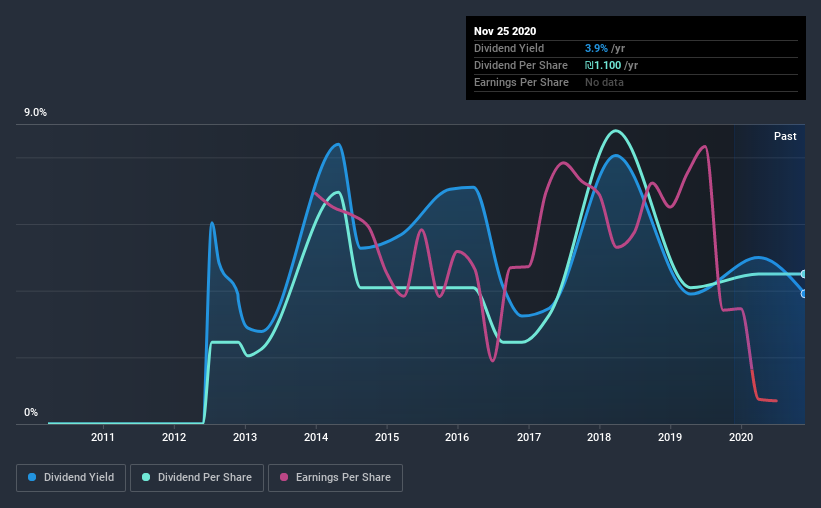Is Harel Insurance Investments & Financial Services Ltd (TLV:HARL) A Smart Choice For Dividend Investors?

Today we'll take a closer look at Harel Insurance Investments & Financial Services Ltd (TLV:HARL) from a dividend investor's perspective. Owning a strong business and reinvesting the dividends is widely seen as an attractive way of growing your wealth. Unfortunately, it's common for investors to be enticed in by the seemingly attractive yield, and lose money when the company has to cut its dividend payments.
With a eight-year payment history and a 3.9% yield, many investors probably find Harel Insurance Investments & Financial Services intriguing. We'd agree the yield does look enticing. Some simple analysis can reduce the risk of holding Harel Insurance Investments & Financial Services for its dividend, and we'll focus on the most important aspects below.
Click the interactive chart for our full dividend analysis

Payout ratios
Companies (usually) pay dividends out of their earnings. If a company is paying more than it earns, the dividend might have to be cut. Comparing dividend payments to a company's net profit after tax is a simple way of reality-checking whether a dividend is sustainable. Although Harel Insurance Investments & Financial Services pays a dividend, it was loss-making during the past year. This is a medium payout level that leaves enough capital in the business to fund opportunities that might arise, while also rewarding shareholders. One of the risks is that management reinvests the retained capital poorly instead of paying a higher dividend.
Remember, you can always get a snapshot of Harel Insurance Investments & Financial Services' latest financial position, by checking our visualisation of its financial health.
Dividend Volatility
Before buying a stock for its income, we want to see if the dividends have been stable in the past, and if the company has a track record of maintaining its dividend. The first recorded dividend for Harel Insurance Investments & Financial Services, in the last decade, was eight years ago. Although it has been paying a dividend for several years now, the dividend has been cut at least once, and we're cautious about the consistency of its dividend across a full economic cycle. During the past eight-year period, the first annual payment was ₪0.6 in 2012, compared to ₪1.1 last year. Dividends per share have grown at approximately 7.9% per year over this time. The dividends haven't grown at precisely 7.9% every year, but this is a useful way to average out the historical rate of growth.
Dividends have grown at a reasonable rate, but with at least one substantial cut in the payments, we're not certain this dividend stock would be ideal for someone intending to live on the income.
Dividend Growth Potential
With a relatively unstable dividend, it's even more important to evaluate if earnings per share (EPS) are growing - it's not worth taking the risk on a dividend getting cut, unless you might be rewarded with larger dividends in future. Over the past five years, it looks as though Harel Insurance Investments & Financial Services' EPS have declined at around 6.5% a year. Declining earnings per share over a number of years is not a great sign for the dividend investor. Without some improvement, this does not bode well for the long term value of a company's dividend.
Conclusion
To summarise, shareholders should always check that Harel Insurance Investments & Financial Services' dividends are affordable, that its dividend payments are relatively stable, and that it has decent prospects for growing its earnings and dividend. We're glad to see Harel Insurance Investments & Financial Services has a low payout ratio, as this suggests earnings are being reinvested in the business. Earnings per share are down, and Harel Insurance Investments & Financial Services' dividend has been cut at least once in the past, which is disappointing. In summary, we're unenthused by Harel Insurance Investments & Financial Services as a dividend stock. It's not that we think it is a bad company; it simply falls short of our criteria in some key areas.
Companies possessing a stable dividend policy will likely enjoy greater investor interest than those suffering from a more inconsistent approach. At the same time, there are other factors our readers should be conscious of before pouring capital into a stock. Case in point: We've spotted 4 warning signs for Harel Insurance Investments & Financial Services (of which 2 don't sit too well with us!) you should know about.
We have also put together a list of global stocks with a market capitalisation above $1bn and yielding more 3%.
When trading Harel Insurance Investments & Financial Services or any other investment, use the platform considered by many to be the Professional's Gateway to the Worlds Market, Interactive Brokers. You get the lowest-cost* trading on stocks, options, futures, forex, bonds and funds worldwide from a single integrated account. Promoted
If you're looking to trade Harel Insurance Investments & Financial Services, open an account with the lowest-cost platform trusted by professionals, Interactive Brokers.
With clients in over 200 countries and territories, and access to 160 markets, IBKR lets you trade stocks, options, futures, forex, bonds and funds from a single integrated account.
Enjoy no hidden fees, no account minimums, and FX conversion rates as low as 0.03%, far better than what most brokers offer.
Sponsored ContentValuation is complex, but we're here to simplify it.
Discover if Harel Insurance Investments & Financial Services might be undervalued or overvalued with our detailed analysis, featuring fair value estimates, potential risks, dividends, insider trades, and its financial condition.
Access Free AnalysisThis article by Simply Wall St is general in nature. It does not constitute a recommendation to buy or sell any stock, and does not take account of your objectives, or your financial situation. We aim to bring you long-term focused analysis driven by fundamental data. Note that our analysis may not factor in the latest price-sensitive company announcements or qualitative material. Simply Wall St has no position in any stocks mentioned.
*Interactive Brokers Rated Lowest Cost Broker by StockBrokers.com Annual Online Review 2020
Have feedback on this article? Concerned about the content? Get in touch with us directly. Alternatively, email editorial-team@simplywallst.com.
About TASE:HARL
Harel Insurance Investments & Financial Services
Offers insurance and financial services in Israel, Europe, and internationally.
Proven track record with moderate growth potential.
Similar Companies
Market Insights
Community Narratives




